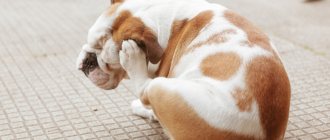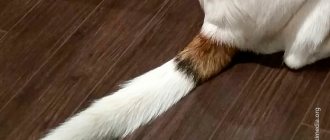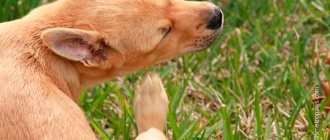What You Need to Know About Floppy Tongue Syndrome in Dogs
Dogs dry out their tongues with their mouths for a variety of reasons, and seeing your dog with a squeaky tongue is probably a common occurrence for you. This is a completely normal dog behavior that dogs display for a variety of reasons, some of which we will look at in more detail later. However, if your dog's tongue constantly expands or they are physically unable or unwilling to remove their tongue from their mouth, they may suffer from something called dangling tongue syndrome.
Epilepsy in dogs: causes
1. Primary, or true, which is inherited.
Develops as a result of inbreeding, intoxication and chronic diseases of the bitch. It is most often observed in dogs between six months and 5 years of age. Idiopathic epilepsy is classified as primary. It differs from false in that the causes of brain dysfunction are unknown, and it does not develop as a result of any disease.
2. Acquired or false can be caused by:
- hypoglycemia, hypocalcemia, hypomagnesemia, hypoxia;
- kidney and liver diseases (cirrhosis, diabetes, etc.);
- hydrocephalus, lissencephaly;
- poisoning with lead, arsenic, organophosphorus compounds, chlorinated hydrocarbons, strychnine;
- rabies, plague, parvovirus encephalitis, toxoplasmosis, tetanus;
- electric shock, poisonous snake or insect bites;
- traumatic brain injuries;
- brain tumors;
- cardiovascular arrhythmia;
- hypovitaminosis (lack of thiamine, D);
- intestinal parasites;
- heat stroke;
It occurs more easily and may stop after the provoking factor is eliminated.
Normal Tongue Positions and Behavior
As mentioned, all dogs hold or hang their tongues out of their mouths, and there are many different reasons and situations that cause this.
Since dogs pant to cool down and their tongues have a large surface area, panting with an open mouth or sticking the tongue helps increase cooling as your dog inhales cooler air, which in turn helps cool the dog's body by transferring heat internally from the mouth and through the surface of the tongue.
Dogs also sometimes stick out their tongues or open their mouths to produce a faint or interesting scent, as dogs also have a scent organ called the Jacobson's Organ at the back of their mouth. Opening the mouth allows dogs to pick up scent particles that are "read" by this organ, and sticking the tongue allows it to pick up tiny scent particles as well.
If your dog smells something tasty or you're cooking dinner, this also triggers your dog's scent abilities and can cause them to salivate and drool and stick out their tongue!
If you notice your dog doing this, it means he has something important to tell you.
Dogs don't only yawn when they're tired. Yawning can be a sign of stress or fear. If a dog starts yawning profusely next to a stranger, then he doesn’t really want to run into that person. He's not ready yet.
Relaxed yawns
Let's confuse you even more... Sometimes a dog starts to yawn because he feels good and comfortable with you. And sometimes she can yawn “for company.” You yawn, and she yawns too. Nice, right? But it’s not so cute when someone else’s dog is nearby, you don’t yawn, but she starts. There may be problems here)!
Leaning on you
notesfromafrica.wordpress.com
This is your dog cuddling with you like that. He urgently needs a portion of your attention and love - so he reaches out to you. This makes him feel safer.
Throws out tongue like a chameleon
That is, the dog sharply sticks out its tongue and no less sharply sticks it back. This is a signal of discomfort. It could refer to a stranger or someone your dog doesn't like. If your dog is usually quite obedient, then such a gesture indicates a desire to assert himself a little.
Climbs into bed with you
The point, as you understand, is not at all that you have a new and surprisingly comfortable bed. The dog just wants to be close to you. Of course, not everyone agrees that dogs should be allowed this, but if you don't mind, let him.
Calmly and intently watches you leave the house
In most cases, a dog licks when it feels hungry or sees food in front of it. But the constant manifestation of such a habit is not the norm, and therefore it is necessary to figure out why the dog is constantly licking itself and what it wants to say to the owner.
Deviations in animal behavior can be caused by several factors. Excessive salivation can be caused by irritability or aversion that occurs due to any illness or stress factors.
Let's list the main reasons why a dog constantly licks itself:
- Your dog may lick his lips after you change the animal's diet. Perhaps you changed the food, gave the dog some new foods and it developed an allergic reaction and for this reason it began to constantly lick itself. What to do in this case? You will find the answer in the article “Allergies in Animals.”
- Sometimes owners forget to provide the animal with access to fresh water. Then licking is a sign that the dog is dying of thirst. Place a large bowl of water within your pet's reach and change the water regularly to keep it fresh. We wrote about thirst in dogs in the article How much water should a dog drink.
- Very often, an animal licks itself when it suffers from any dental problems, for example, its teeth are loose or falling out. An experienced veterinarian will help you here. This symptom is also triggered by most infectious or bacterial diseases.
- Excessive licking indicates food or chemical poisoning. Consider that she may have eaten something off the floor or while walking, she may have swallowed some household chemicals, she may have eaten some cosmetics, or she may have licked rodent or insect poisons.
- Dogs lick with chronic pathologies of the kidneys and liver. That is why, if you notice such a sign, you should immediately consult a doctor to refute fears about possible health problems.
- This may be a sign of a psychological problem. Scientists say that dogs with a dependent nature often lick their lips. Puppies and large dogs that tend to obey behave this way. Owners like this kind of display of affection, but according to experts, constant licking is an extremely negative factor. Over time, strong submission can change towards active dominance. When owners encourage such displays of emotion, the animal begins to think that licking is a good way to attract attention.
- One of the reasons for constant licking is heartburn. To eliminate it, you can try feeding the dog food soaked in water or giving less fatty food.
- Hyperacid gastritis makes itself felt by increased salivation. Subsequently, the animal constantly licks itself. This gastritis is manifested by increased production of gastric juice and hydrochloric acid in the dog's body.
- A dog may lick its lips for a long time when it is vomiting. When she also refuses to eat, she needs to be examined by a veterinarian. If she has an appetite, then most likely she has stomach problems or gastritis.
- The dog will begin to lick itself frequently and for a long time if it has swallowed a foreign object. This happens often. For example, an ungnawed bone could be stuck in the mouth. Try to wear sterile gloves and carefully examine the dog’s mouth, and if possible, remove the foreign object yourself. You can trust professionals in this matter.
What should an owner do when a dog constantly licks itself?
First, calm down and not suspect the worst. Try testing a few of the assumptions above about the possible causes of this disorder. Think about whether the dog ate something bad, return it to its old diet. Rule out heartburn and behavioral factors. If the dog has been eating well lately and has not been able to pick up anything off the floor or eat anything extra, it does not need increased attention, praise or care - examine the oral cavity to see if there is a foreign body or dental disease. If the cause has not been identified, the symptom remains and help cannot be provided, contact your veterinarian.
If you are sure that your dog's licking is purely a behavioral disorder, several proven methods will help you. The animal's attention needs to be redirected. A dog licks its lips when it is bored. She can also lick her paws and lick objects. It happens that the dog even licks the owners. Distract her and let her play with rubber or soft toys. While walking, play active games with her - throw a stick or a ball. This way the animal’s life will be full, varied, and she won’t have to entertain herself with various nonsense.
If the animal starts licking objects or you, lubricate them with something sour or spicy, or buy a special spray at a pet store. This method doesn't seem very pleasant, but it works. The dog will remember the unpleasant sensations when licking and will not do it again.
If your dog has a habit of licking its paws or other parts of its body, and, we repeat, you have ruled out possible pathologies and are sure that this is a behavioral problem, use the same method. Rub something sour or peppery on her paws. But! Pepper should be diluted with water and used sparingly so that the animal does not burn its tongue. Sour taste is safer. By the way, dogs can’t even stand the taste of apples. You can use this method.
That's all. We wish you success and health to your pets!!!
Share your impressions
What Causes Loose Tongue Syndrome in Dogs?
Floppy tongue syndrome can occur due to injury or illness that damages nerves in the head and face, or due to a conformational disorder that prevents the mouth from closing completely or the tongue retracting.
Injuries such as blows and falls can cause this type of damage, as well as some neurological conditions that affect motor control and muscle control, or nerves in the brain, head and face. Some breeds and types of dogs also have muzzles that are short compared to the length of their tongues, including many brachycephalic breeds such as the English Bulldog, which may contribute to this problem.
If your dog's tongue will not be distracted or is always hanging out, it is important to have your dog see your veterinarian so they can determine the root cause of the problem and, if necessary, address the problem at the root.
For certain health conditions and injuries, treatment or correction is possible, while for conformational defects or conditions that cannot be reversed, caring for a dog with dangling tongue syndrome may be based on mitigating the problems that a dangling tongue can cause. This may mean keeping the tongue moist, serving soft foods and otherwise supporting the dog's needs, keeping them comfortable and minimizing the impact of the condition on their daily life.
Source
Why does the dog grunt?
The main feature of the Chihuahua breed that is important to know about is its very short and pointed muzzle. Because of this structure, the dog has “reverse breathing” - an irritated palate provokes a spasm of the pharynx. This syndrome is also called “reverse sneezing.”
Many owners are seriously frightened by such manifestations of their pets - the animal can suddenly strongly stretch its neck, tense its chest muscles, and strongly arch its back. At the same time, the Chihuahua convulsively gasps for air, wheezes and makes loud grunting sounds, as if he is suffocating.
Don't be afraid when your pet grunts through his nose - this is how he tries to restrain himself in order to start breathing normally again. Some owners are touched by pets that make such funny sounds.
IMPORTANT!
You have to be on your guard - there are times when Chihuahuas begin to choke. It’s better to prevent trouble - monitor your pet’s health so that he doesn’t get sick, overexcited or sad, because all these reasons can provoke strong grunting.
Why does a dog stick out its tongue: is it normal?
A dog's tongue, which is almost always outside, is an indicator of the animal's completely normal, ordinary state. Dogs have very few sweat glands, and they are located on surfaces that are completely devoid of hair, for example, in the area of the pads on their paws.
In order not to die from overheating, the animal must cool itself. With a minimal number of sweat glands, it is impossible to do this solely with their help, so the tongue comes to the rescue.
In dogs, it is large and long, which creates a fairly large surface for moisture evaporation. When it is outside, saliva evaporates from it, which leads to a decrease in the animal's body temperature and its stabilization even in very hot weather.
Do not think that this action is more typical for large and furry dogs. Small representatives of the dog breed, for example, Chihuahuas, very often breathe with their mouths open, which is a completely common, natural phenomenon for them. So the amount of fur does not determine the breathing rate.
Rest and sleep
Dogs stick out their tongue when they sleep
Dogs stick out the tip of their tongue or their entire tongue when they feel comfortable and calm. If the dog has just eaten, played heartily, or lies next to the owner with his tongue hanging out, this means that he is happy and relaxed. Dogs stick their tongue out of their mouth after eating food due to excessive drooling. Dogs often stick out their tongues when they sleep, which supports the idea that a dog's tongue sticking out is a sign that the animal is completely relaxed.
Interesting: The bravest dog breeds - list, description, photos and videos
In what situations can language serve as a signal of trouble?
Normally, a dog's tongue is colored in all shades of pink, with the exception of rare variants, for example, the blue tint of the chow chow. It should be moist, without excessive drooling, clean and undamaged.
If the dog has a dry tongue, covered with ulcers or plaque, inflamed, swollen or simply swollen, with a discoloration, this may indicate the presence of a disease. This condition most often indicates a respiratory infection or a significant disruption of the digestive process, but it can also be a completely different problem.
Therefore, an animal with signs of trouble must be taken to a veterinarian.
The doctor will examine the dog and determine if there is a reason for concern. If necessary, he will conduct the necessary tests and prescribe appropriate treatment.
If a pet sleeps with the tip of its tongue slightly sticking out, this indicates that it is completely relaxed. Your dog is happy and calm, he feels good, and he trusts you 100%.
Source
Epilepsy in dogs: symptoms
Cramps most often occur during rest or sleep. Before the seizures begin, the animal becomes nervous, whines, and tries to hide. There is profuse salivation.
Epileptic seizure
Afterwards, the “ictal stage” begins: the limbs stretch, the paws twitch convulsively, and the head throws back. The pupils are dilated and do not respond to light. There is intermittent breathing and bloody foam from the mouth due to biting. The front and hind legs involuntarily bend and straighten. Involuntary urination and bowel movements may occur. The animal is usually unconscious.
Then the “postictal stage” begins: the animal is disoriented in space, jumps up, bumps into surrounding objects, and whines. Then he comes to his senses.
Types of seizures
Depending on the severity, the following types occur:
- Generalized attack.
The above stages are clearly expressed.
- Mild attack.
There is virtually no petrification or stretching of limbs. The animal is conscious.
- Minor epileptic seizure.
Virtually no clinical manifestations. Consciousness is lost only for a few seconds. Muscle tone is maintained. The animal has a blank look.
- Partial attack.
Convulsive movements affect a specific part of the body. It can develop into generalized.
The dog's position is unnatural during a seizure
Why does the tip of a dog’s tongue stick out: physiological reasons and their consequences
What to do if the tip of your dog's tongue sticks out? Could a cute grimace indicate health problems and should you be worried? Let's look at the causes and consequences. There are several main reasons and very often, everything is explained quite simply - the dog has a long tongue. Yes, this happens, there are animals with too long ears, fingers, tails and tongues too.
If you do not notice that the dog is experiencing discomfort or biting its tongue, there is no reason to worry. Does your pet have breeding value and are you concerned about its career? In this case, you need to consult a doctor and a breed expert. If no abnormalities are found in the dog, a too long tongue will most likely not affect its exhibition career. Whether such a special quadruped should be allowed to be bred is up to the breeders to decide; as they say, this is a matter of conscience and integrity.
Note! The tip of your tongue sticking out during sleep is normal and indicates deep relaxation.
Prevention
You can prevent the tragic consequences of the tongue if you carefully monitor the dog’s condition, namely:
- Check your mouth regularly for inflammation and damage.
- Take your pet for preventative dental cleaning once every six months.
- Make sure your dog doesn't pick up food from the ground.
- Remove all sharp bones from meat and fish.
- Do not serve food excessively hot or cold.
- Make sure that the dog does not have access to chemical reagents.
Note! If your dog has already undergone tongue surgery, carefully monitor oral hygiene to prevent re-infection. If symptoms of necrosis reappear, you should consult a veterinarian as soon as possible.











